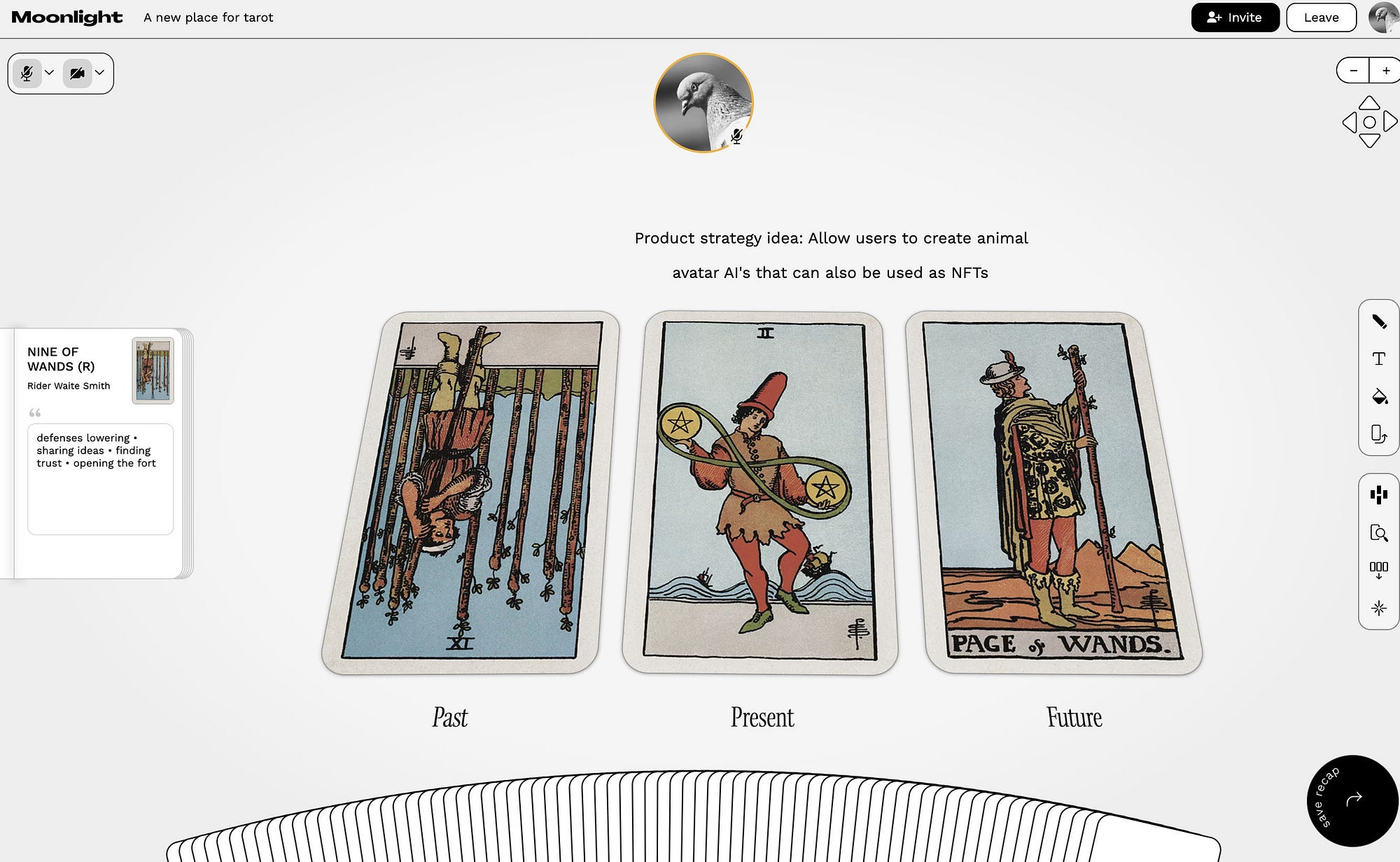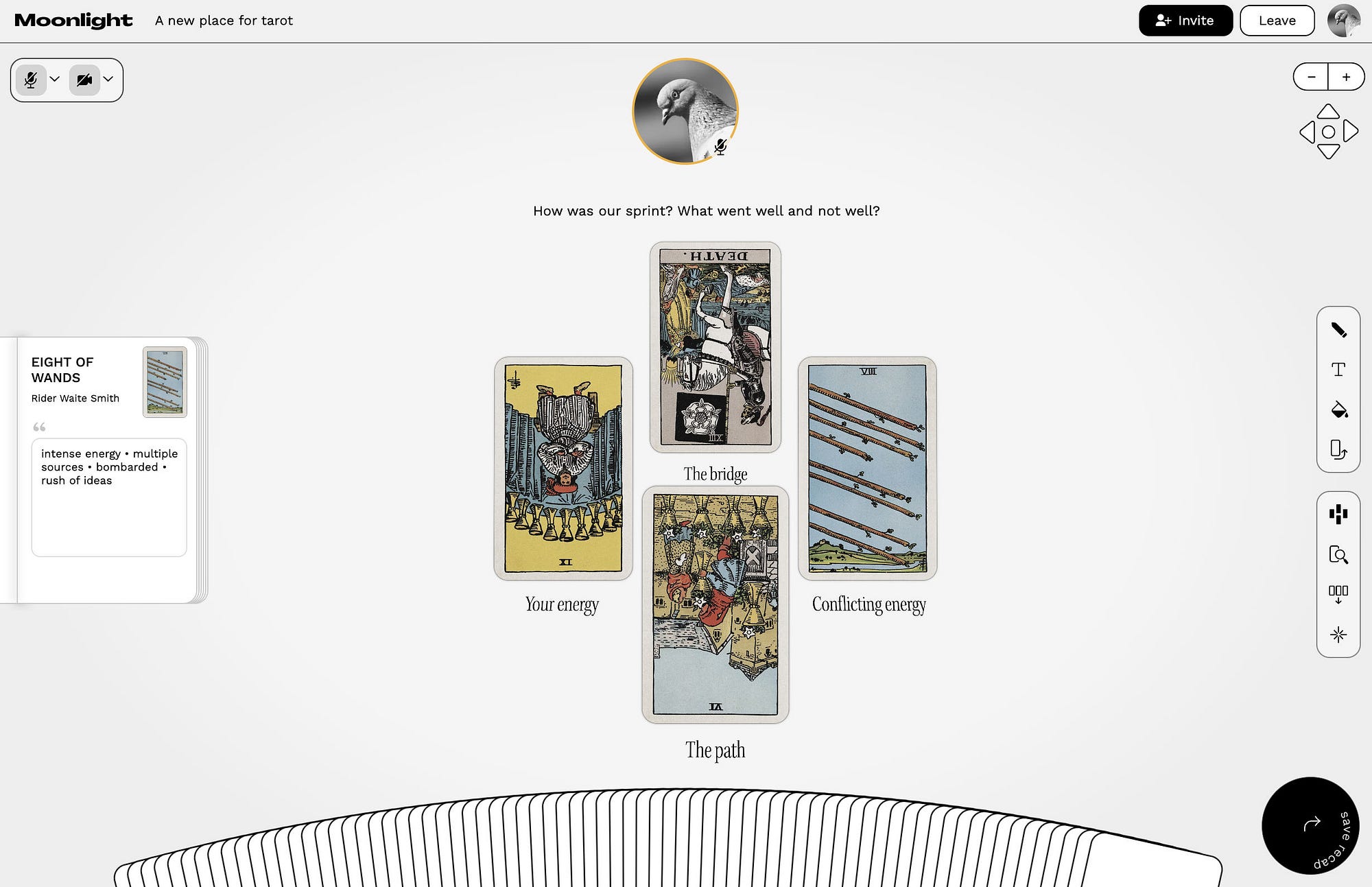and how to use tarot cards for sprint planning.
A Product Manager's 24 Reflections on 2024. illustration by author.
2024 felt like another transformative year for product management. Once again, AI continues to operate in the emotional space between pure excitement and existential dread. An LLM company could announce an AI that helps me with my shopping list or a robot that replaces my job tomorrow, and I would be equally unsurprised.
As we continue to reconcile in this odd place, I think it's worth bearing in mind the wise words of tech guru Jaron Lanier that the more sophisticated technology becomes, the more damage we can do with it, and the more we have a 'responsibility to sanity'. This responsibility to act morally and humanely is a duty we should all uphold. We should demand that those who do not yield this technology for the common good of society should be held accountable for their actions and reminded of those consequences in the real world.
Even the best reasoning models don't seem smart enough to reason themselves out of an unreasonable scenario.
In my quest to try to understand if LLMs could replace me, I've made a curious observation: even the best reasoning models don't seem smart enough to reason themselves out of an unreasonable scenario. Let me explain. Try asking an LLM, for example, to create a strategy for a product that equally appeals to the extreme cost-cutters who want the absolute cheapest solution and to luxury users who demand the highest possible quality at any price without offering any segmentation or tiering. We know building such a thing is almost impossible, but an LLM will always regress to a mean of generality, ignoring the realities that most of us deal with every day. And such scenarios are prevalent in our line of work.
LLMs assume a world of logical order and reasonably informed decision, but as many of us know, this is not how the world operates, and I assume for a model based on logical predictive token selection, this is especially challenging.
It can't really help you account for competitors undercutting your pricing, internal work politics diverting funding, new regulations, unexpected challenges or how customers react to your offerings. You can put all this into a prompt, but I have not seen a creative or insightful response. At best, it's great as a type of reflective journaling.
The next big productivity hack for product managers — Tarot Cards
From LLMs to Tarot
As a result, I have moved away from LLMs and to the next big productivity hack for product managers — Tarot Cards!! Hear me out. As product managers, we're often tasked with finding clarity in chaos, identifying patterns, and making decisions when there's no clear data or answer. What better way to tackle that than a little mysticism?
 Tarot card reading by author. app.moonlight.world
Tarot card reading by author. app.moonlight.world
This tarot reading, for example, tells me my idea for using AI avatars that can be turned into NFTs has indeed had setbacks and rejections in the past, but now, in the present, AI has advanced to the point that we can really deliver on the original promise of helping users while making them rich, and the future represented by the page of wands shows us there is much exploration and creative journeying for me the and team ahead.
It's even great for retrospectives.
 Tarot card reading by author. app.moonlight.world
Tarot card reading by author. app.moonlight.world
Here, for example, after exploring our AI animal NFT idea, the team indicates dissatisfaction and emotional fulfilment despite efforts. The bridge reversed death card symbolises a resistance to change or transformation, the team is not fully embracing the changes we need to make this idea happen. Our conflicting energy is that the team believes we have too many conflicting priorities between this idea and "real work," as they say. But our path forward is clear: the team needs to embrace change and release these ideas of "refactoring" that are holding them back.
Once again, bang on the money, such a time saver! Have a think about it, but not too hard 🤣.
Of course, I'm not suggesting tarot replace the product management method. But for those days when the chaos of the world feels a bit much, give it a go. I'm not a believer in tarot myself, but the process of using an unreasonable tool for an unreasonable scenario helps frame everything in an oddly more approachable way. We get the universe to laugh at itself, and it's usually in those moments of reflection that we have our best insights.
That all said, I think we should all really be looking forward to how our profession changes in 2025. I've often been a proponent of the generalist product manager — one that is both thinker and doer — able to understand the worlds of engineering, data science, UX, marketing, and sales deeply and apply those skills to program prototypes, train/test models, run user discovery sessions, propose marketing copy and build internal strategies that make sales excited to sell. It's an exciting time for our profession, and I believe it will only become more critical as tools enable us to scale our capabilities more and more. This marks a turning point for the single domain specialist product manager.
These are just a few of my reflections, but fear not — I have plenty more! Dive into the thoughts and insights below that gave me pause in 2024, and I hope set you up for a fantastic 2025!
The 24 Reflections That Guided Me 2024
- Always work backwards from what good looks like. Simply put, the beginning of your story should be the opposite of the end. Find the opposite of your transformation — this is where the story of your product should come from.
- Everything starts with vision. Spend your time on vision — you will never regret it, and take the time to write it out clearly
- As a product person you must become comfortable with selling. Sell sell sell. Sell externally, sell internally. Teach others how to sell for you — even the people selling your product
- The best way to criticize is to criticise with the goal of making something better
- You need to think about how your ideas can compound over time. Your strategy needs to consider how the thing you build gets better and more impactful over time with less effort
- "Even if your vision isn't clear, curiosity is your best bet."
- "One should be as skeptical and critical when things go better than expected as when they go worse than expected"
- "If you are impressed with someone's work, you should tell them or even better tell their boss"
- "Slow, consistent progress is still a million times better than no progress"
- "Learning to be comfortable with public criticism is hard — people will make accusations even without any truths and you have to learn to live with it"
- "AI is not smart enough to reason itself out of an unreasonable scenario"
- Most arguments can't be won by arguing. However, you can persuade someone by asking them the right questions
- "When you are right, you are learning nothing"
- "By reading a lot of history you can understand how weird the past was and that way be comfortable with how weird the future will be"
- "Be honest with yourself on how much you owe to luck"
- "It's worth looking foolish in the short term to look like a genius later"
- "The challenge isn't to find better tools to lead a more productive life, it's learning to be mindful of the tools that have already taken root. Mindfulness while using technology is important, and therefore the future belongs to those who can tame their distractions." (Paul Jun, Connect the Dots)
- "On days that feel really hopeless, just go and do something for someone else. Buy a sandwich for a homeless person."
- Use the elenchus technique as a device for finding the truth. The elenchus is mostly a device for refuting claims. At first this might sound unexciting. Who wants to spend all their time falsifying things? Isn't it better to build than to tear down? But on a Socratic view those are two sides of the same coin. (Ward Farnsworth, The Socratic Method)
- The odd thing about being successful is your anxiety will scale proportionally with your ambition, so do feelings of loneliness, and it always takes longer than you expect. Both the good and the bad amplify along the way.
- "Dissatisfaction with the answers you give yourself is a symptom of good health." (Ward Farnsworth, The Socratic Method)
- "It turned out that the most efficient breathing rhythm…works out almost exactly to 5.5 breaths a minute." (James Nestor, Breath)
- "As individuals, we tell people the most about who we are when everything goes wrong…" (Rosie, You're Only As Good As Your Worst Day)
- Imitate those you admire. Even if your ability does not equal theirs, at least it will savour of it.
Have a great 2025 everyone!

